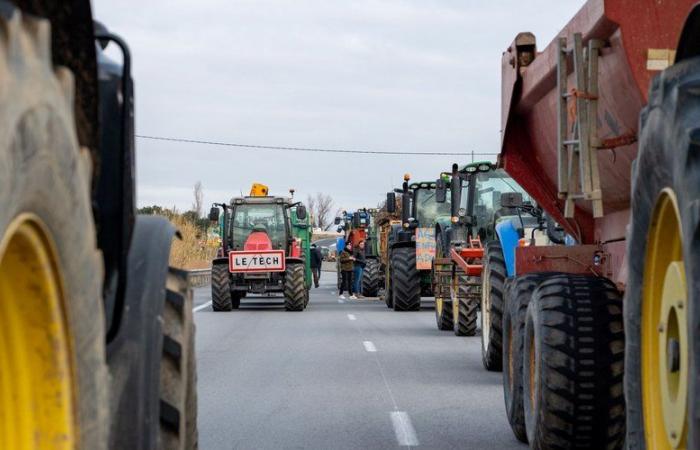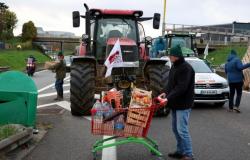
“France, do you still want your peasants?” : the cry of anger resonated this Monday from Var to Calvados, everywhere where the majority union alliance FNSEA-JA launched more than 80 symbolic actions, a prelude to a new cycle of mobilization. Less than a year after a historic mobilization in the countryside, which resulted in January in blockages of sections of highways in the country, the agricultural unions believe that the accounts are not there. They are once again calling on their troops to demonstrate, but in dispersed order, in the run-up to their professional elections which will be held in January.
It was the majority alliance that first threw its forces into battle. The FNSEA-Young Farmers (JA) alliance announces “85 points de manifestation” across the country, but without any highway blockages. At Cannet-des-Maures (Var)some 300 farmers placed dirt on the road and planted crosses symbolizing the death of French agriculturewhich they consider threatened by the free trade agreement that the EU is negotiating with Latin American Mercosur countries. Next to the Belgian borderfarmers checked heavy goods vehicles. HAS Lyonoperators have posted town entrance signs. In front of the prefecture of Vesoulthey dumped three skips full of corn stover. Rallies in front of prefectures or snail operations are organized almost everywhere in France.
As of Sunday evening, the impatient had brought out the tractors, going in a procession near the air base of Villacoublaynear Paris, from where flew President Emmanuel Macron for the G20 in Rio in Brazil. “Macron, if you go to Rio, don’t forget your hillbillies”proclaimed a banner, hung on a bridge.
The actions are above all symbolic, the majority alliance wanting to alert the public authorities but “not to bore the French”: “What we want is to express throughout the territory this agricultural distress and this need to reset the course“, underlined on RMC the president of the JA, Pierrick Horel.
In Calvados, the local representative of the FNSEA Xavier Haie summarizes: “We have issued a first warning to say stop the Mercosur negotiations.” But farmers are also waiting for the government to put in place “what he had promised: agricultural orientation law, administrative simplification…”.
“Agricultural revolt”?
Weakened by the worst wheat harvest in 40 years and emerging animal diseases, farmers believe they have not reaped the fruits of last winter's anger: the realization of the 70 commitments then made by the Attal government was slowed down by the dissolution of the National Assembly. The demonstrations were at the time directed against the increase in agricultural fuel (GNR) or the European Green Deal.
This time, it is the expected outcome of the proposed free trade agreement with countries from Mercosur (Brazil, Argentina, Uruguay, Paraguay) which ignites the countryside. Despite opposition from the French political class, the European Commission, pushed by countries like Germany and Spain, seems determined to sign this pact by the end of the year which will allow Latinx countries -Americans to sell more beef, chicken or sugar without customs duties.
“We will continue to oppose” to the agreement, assured Emmanuel Macron on Sunday, traveling to Argentina before the G20, seeking to “reassure farmers”.
Monday on France Bleu Besançon, Minister of Agriculture Annie Genevard said “understand anger” farmers, while emphasizing that the draft budget contained “nearly 300 million in social and tax relief”.
Recognizing progress on simplification or state-guaranteed loans, the FNSEA plans to continue the mobilization until mid-December, with symbolic actions such as the occupation of the Europe Bridge linking Strasbourg to the German city of Kehl. in the afternoon or “fires of anger” in different departments.
The FNSEA, which wants to be a union “responsible”non-violent, seeks to distance itself from the Rural Coordination (CR, 2nd agricultural union), which is accustomed to heavy-handed actions and which gained a lot of visibility last winter.
The CR, which accuses the FNSEA of “co-management” with the government, chose to wait until its congress was held (Tuesday and Wednesday) to amplify its mobilization. She promises “an agricultural revolt” with a “food cargo blockage” from Wednesday in the South-West if “no progress” is not noted in the Mercosur file.





